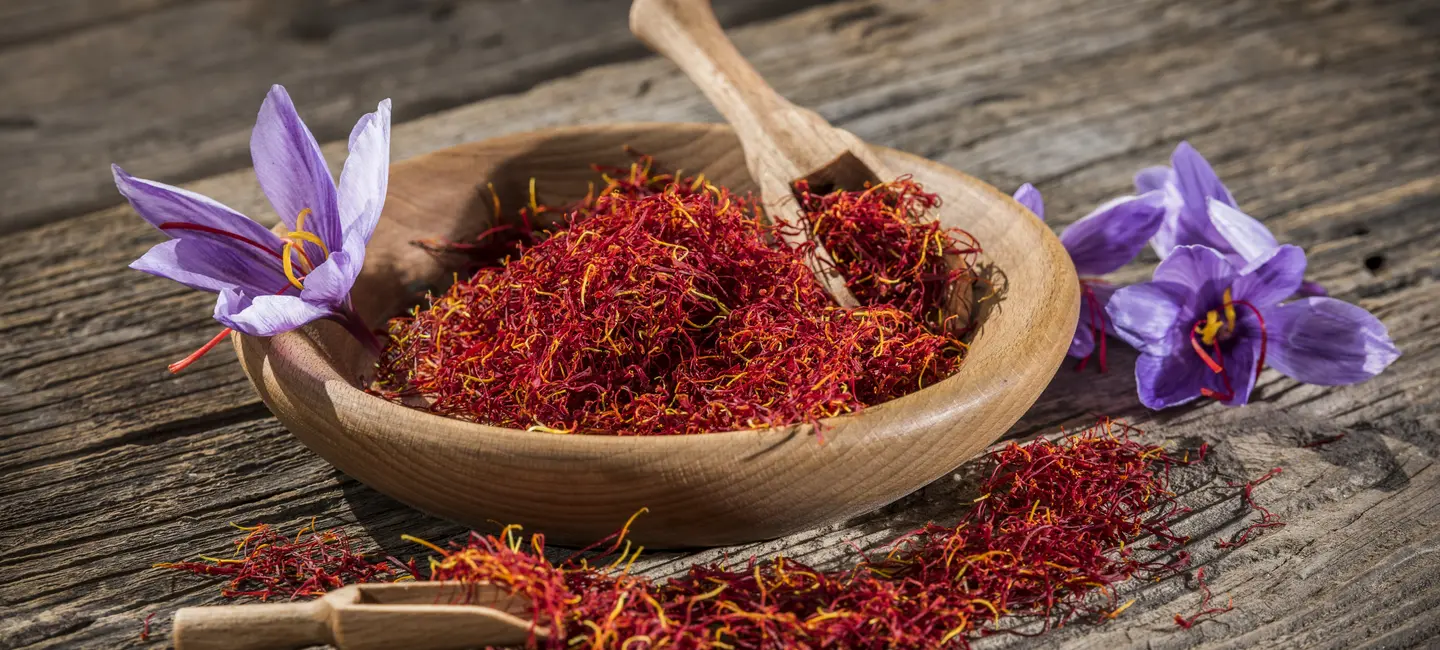
Saffron (Crocus sativus) is a plant. The dried thread-like parts of the flower (stigmas) are used to make saffron spice, food coloring, and medicine.
Saffron contains chemicals that might alter mood, kill cancer cells, decrease swelling, and act like antioxidants. It can take 75,000 saffron blossoms to produce a single pound of saffron spice. Saffron is largely cultivated in Iran and harvested by hand. It's one of the world's most expensive spices.
People commonly use saffron for depression, anxiety, Alzheimer disease, menstrual cramps, premenstrual syndrome (PMS), and many other conditions, but there is no good scientific evidence to support many of these uses.
Is It Effective?
NatMed Pro rates effectiveness based on scientific evidence according to the following scale: Effective, Likely Effective, Possibly Effective, Possibly Ineffective, Likely Ineffective, Ineffective, and Insufficient Evidence to Rate.
- Alzheimer disease. Taking saffron by mouth might improve some symptoms of Alzheimer disease by a small amount.
- Depression. Taking saffron by mouth with or without antidepressant drugs seems to improve symptoms of depression.
There is interest in using saffron for a number of other purposes, but there isn't enough reliable information to say whether it might be helpful.
Is it Safe?
When taken by mouth: Saffron is commonly consumed as a spice or coloring in foods. Saffron is possibly safe when taken as a medicine in doses up to 100 mg daily for up to 26 weeks. Some common side effects include drowsiness, stomach problems, and nausea or vomiting. Allergic reactions are also possible.
Taking large amounts of saffron by mouth is possibly unsafe. High doses of 5 grams or more can cause poisoning. Doses of 12-20 grams can cause death.
When applied to the skin: There isn't enough reliable information to know if saffron is safe or what the side effects might be.
Special Precautions & Warnings:
Pregnancy: Saffron is commonly consumed as a spice or coloring in foods. Taking saffron by mouth in amounts larger than what is normally found in food is likely unsafe. Larger amounts of saffron can make the uterus contract and might cause a miscarriage.
Breast-feeding: There isn't enough reliable information to know if saffron is safe to use when breast-feeding in amounts greater than those found in food. Stay on the safe side and stick to food amounts.
Bipolar disorder: Saffron seems to be able to affect mood. It might trigger excitability and impulsive behavior in people with bipolar disorder. Don't use saffron if you have this condition.
Allergies to Lolium, Olea (includes olive), and Salsola plant species: People who are allergic to these plants might also be allergic to saffron.
Surgery: Saffron slows down the central nervous system. Anesthesia and other medications used during surgery also affect the central nervous system. Stop taking saffron at least two weeks before a scheduled surgery.
Caffeine
Interaction Rating=Moderate Be cautious with this combination.
Saffron might decrease how quickly the body breaks down caffeine. Taking saffron with caffeine might increase the effects and side effects of caffeine in some people.
Medications for diabetes (Antidiabetes drugs)
Interaction Rating=Moderate Be cautious with this combination.
Saffron might lower blood sugar levels. Taking saffron along with diabetes medications might cause blood sugar to drop too low. Monitor your blood sugar closely.
Medications for high blood pressure (Antihypertensive drugs)
Interaction Rating=Moderate Be cautious with this combination.
Saffron might lower blood pressure. Taking saffron along with medications that lower blood pressure might cause blood pressure to go too low. Monitor your blood pressure closely.
Sedative medications (CNS depressants)
Interaction Rating=Moderate Be cautious with this combination.
Saffron might cause sleepiness and slowed breathing. Some medications, called sedatives, can also cause sleepiness and slowed breathing. Taking saffron with sedative medications might cause breathing problems and/or too much sleepiness.
Herbs and supplements that might lower blood pressure: Saffron might lower blood pressure. Taking it with other supplements that have the same effect might cause blood pressure to drop too much. Examples of supplements with this effect include andrographis, casein peptides, L-arginine, niacin, and stinging nettle.
Herbs and supplements that might lower blood sugar: Saffron might lower blood sugar. Taking it with other supplements with similar effects might lower blood sugar too much. Examples of supplements with this effect include aloe, bitter melon, cassia cinnamon, chromium, and prickly pear cactus.
Herbs and supplements with sedative properties: Saffron might cause sleepiness and slowed breathing. Taking it along with other supplements with similar effects might cause too much sleepiness and/or slowed breathing in some people. Examples of supplements with this effect include hops, kava, L-tryptophan, melatonin, and valerian.
There are no known interactions with foods.
Saffron is commonly used as a spice and coloring agent in foods. As medicine, saffron extract has most often been used by adults in doses of 20-100 mg by mouth daily for up to 3 months. Speak with a healthcare provider to find out what dose might be best for a specific condition.
Autumn Crocus, Azafrán, Azafron, Croci Stigma, Crocin, Crocus Cultivé, Crocus sativus, Indian Saffron, Kashmira, Kesar, Kumkuma, Saffron Crocus, Safran, Safran Cultivé, Safran Espagnol, Safran des Indes, Safran Véritable, Spanish Saffron, True Saffron, Zafran.
Information on this website is for informational use only and is not intended to replace professional medical advice, diagnosis, or treatment. While evidence-based, it is not guaranteed to be error-free and is not intended to meet any particular user’s needs or requirements or to cover all possible uses, safety concerns, interactions, outcomes, or adverse effects. Always check with your doctor or other medical professional before making healthcare decisions (including taking any medication) and do not delay or disregard seeking medical advice or treatment based on any information displayed on this website.
© TRC Healthcare 2024. All rights reserved. Use and/or distribution is permitted only pursuant to a valid license or other permission from TRC Healthcare.
